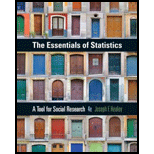
Concept explainers
For each research project listed here, identify the variables and classify them in terms of level of measurement and whether they are independent or dependent.
a. For a research project in a political science course, a student collected information for 50 nations. She used infant mortality rates (the number of infant deaths per 100,000 population) as a measure of quality of life and the percentage of all adults who are permitted to vote as a measure of democratization. Her hypothesis was that quality of life is higher in more democratic nations.
b. A highway engineer wonders whether increasing the speed limit on a heavily travelled highway will result in more accidents. He plans to collect information on traffic volume, number of accidents, and number of fatalities for the six month periods before and after the speed limit is changed.
c. Students are planning a program to promote “safe sex” and awareness of other health concerns on campus. To measure the effectiveness of the program, they plan to survey students about their knowledge of safe sex practices before and after the program.
d. A graduate student asks 500 female students whether they have experienced any sexual harassment on campus. Each student is asked to estimate the frequency of these incidents as either “often, sometimes, rarely, or never.” The researcher also gathers data on age and major to see whether there is any connection between these variables and frequency of sexual harassment.
e. A supervisor in the solid waste management division of city government is assessing two different methods of trash collection. One area of the city is served by trucks with two-man crews who do “backyard” pickups, and the rest of the city is served by “high-tech” single-person trucks with curbside pickup. The assessment measures include the number of complaints received from the two different areas over a six-month period, the amount of time per day required to service each area, and the cost per ton of trash collected.
f. Does tolerance for diversity vary by race or ethnicity? Samples of white, black, Asian, Hispanic, and Native Americans have been given a survey that measures their interest in and appreciation of cultures other than their own. Degree of tolerance is scored as “high, moderate, or low.”
g. States have drastically cut their budgets for mental health care. Will this increase the number of homeless people? A researcher contacts a number of agencies serving the homeless in each state and develops an estimate of the size of the homeless population before and after the cuts.
h. The adult bookstore near campus has been raided and closed by the police. Your social research class has decided to poll a sample of students to find out whether he or she supports the store’s closing, how many times each has visited the store, and whether he or she agrees that “pornography causes sexual assaults on women.” The class also collects information on the gender, political philosophy, and major of the students to see if these characteristics affect opinions.
Trending nowThis is a popular solution!

Chapter 1 Solutions
Essentials Of Statistics
Additional Math Textbook Solutions
Essentials of Statistics (6th Edition)
Introductory Statistics
Statistics for Engineers and Scientists
Elementary Statistics: A Step By Step Approach
Business Analytics
Elementary Statistics (13th Edition)

 Glencoe Algebra 1, Student Edition, 9780079039897...AlgebraISBN:9780079039897Author:CarterPublisher:McGraw Hill
Glencoe Algebra 1, Student Edition, 9780079039897...AlgebraISBN:9780079039897Author:CarterPublisher:McGraw Hill Linear Algebra: A Modern IntroductionAlgebraISBN:9781285463247Author:David PoolePublisher:Cengage Learning
Linear Algebra: A Modern IntroductionAlgebraISBN:9781285463247Author:David PoolePublisher:Cengage Learning Big Ideas Math A Bridge To Success Algebra 1: Stu...AlgebraISBN:9781680331141Author:HOUGHTON MIFFLIN HARCOURTPublisher:Houghton Mifflin Harcourt
Big Ideas Math A Bridge To Success Algebra 1: Stu...AlgebraISBN:9781680331141Author:HOUGHTON MIFFLIN HARCOURTPublisher:Houghton Mifflin Harcourt Functions and Change: A Modeling Approach to Coll...AlgebraISBN:9781337111348Author:Bruce Crauder, Benny Evans, Alan NoellPublisher:Cengage Learning
Functions and Change: A Modeling Approach to Coll...AlgebraISBN:9781337111348Author:Bruce Crauder, Benny Evans, Alan NoellPublisher:Cengage Learning




